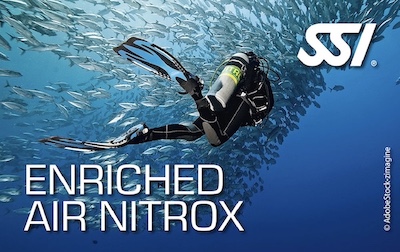| Class | Standard |

|
|---|---|---|
| 1. Nitrox | SDI Link | |
| 2. Night & Limited Vis | SDI Link | |
| 3. Navigation | SDI Link | |
| 4. A 4th Class of Your Choice | ||
| 5. Deep Diving | SDI Link | |
| 6. O2 Provider | ||
| 7. CPR / AED | ||
| 8. Rescue Diver | SDI Link | |
| 9. GUE Fundies | GUE Link | |
Class Discussion
I do NOT recommend you take the "Advanced Adventure" or "Advanced Open Water" packages often sold by the various dive agencies. They give you a taste of these classes and then hand you the Advanced Open Water (AOW) card without having any real experience. Save your money and then take the actual full class instead. There is no magical thing that happens when you have your Advanced Open Water card.* I'm using the SSI naming convention and graphics because those are the classes I actually took and they are the images on the back of my certificate card. Not because I recommend or don't recommend SSI specifically.

Nitrox
10s of thousands of divers never dive with Nitrox. But more and more places will provide Nitrox for free when you rent a tank from them...so you should. One of the cheaper and easier classes to take since it does not involve any actual dives, but you do learn a little bit about gas science.
Night & Limited Visibility
Here in Chicagoland...we dive in murky waters from day 1 so not real useful as a skill heavy class. It can be a bit daunting for some people to be diving in the dark, so don't assume you'll be just fine. Have an instructor around for your first go. Primarily, it will introduce you to the use of flashlights underwater. It also gives you a reason to buy your first flashlight.
Navigation
I put Navigation after Night & Limited Visibility only because it means you'll get a couple more dives in before you are asked to hold your bouyancy level and head in a straight line while looking at you compass. You'll do some land drills for basic compass use and learn some other underwater tricks. Then off you'll go into the water to try going in a straight line, coming back to your starting point, going a square, etc. It also gives you a reason to buy a compass.
4th Class of Your Choice
So why a 4th class? Only because some agencies require (5) Five "specialty" classes to award you the 'Advanced Open Water' level if you do not take the "zero to hero" AOW package like I advised you not to do. I would recommend either Drysuit, Limited Wreck or Science of Diving to round out your 5th specialty. I took Science of Diving because I wanted to understand "the why" behind all of the rules and guidance.
Deep Diving
Not technically needed, and I went 80 dives before I took the Deep class because there was no good place to do the deep dive around me at the time. But if you feel apprehensive about going deeper than 60ft...you can have an instructor with you for your first couple times down near the gas narcosis zone. There is an argument to be made regarding "not diving beyond your training" that could change your mind into doing this class sooner than I did.
O2 Provider
Many dive agencies offer some kind of Oxygen Provider course. If yours does not, then find a local DAN instructor and take one from them.CPR / AED
Many dive agencies bundle the CPR & AED course with the Oxygen Provider course. If yours does not, then find a local Red Cross or DAN instructor and take one from them.
